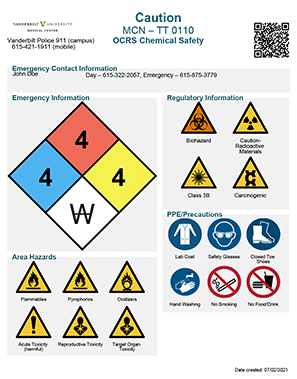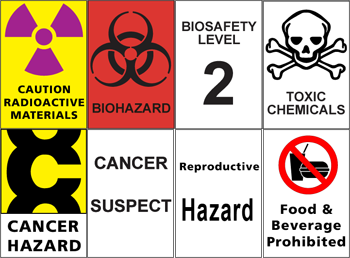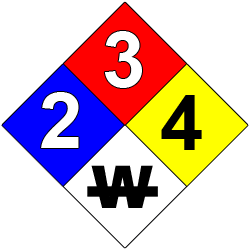
OCRS posts HIP signs at laboratory locations where hazardous materials (biological, chemical or radioactive) are used or stored. All laboratories containing hazardous materials should be posted.
If you need to enter a location posted with a hazard sign, always consult with personnel before entering and make sure the room is secured when you leave.
Information included on the signs:
I. Symbols
Symbols used on this sign indicate the presence of one or more of the following: toxic chemicals and gases, cancer-causing and suspected cancer-causing chemicals, radioactive materials, biological hazards, and reproductive hazards.
Every sign instructs visitors that food and beverage are prohibited inside these rooms.
Examples of symbols used on signs

II. National Fire Protection Association (NFPA)
The National Fire Protection Association (NFPA) hazard identification system uses a color-coded diamond to represent four different hazards.
The different colors represent three different types of hazard that may be associated with chemicals:

- Blue indicates health hazard.
- Red indicates flammability.
- Yellow indicates reactivity.
- White represents other hazards such as if a chemical reacts violently with water (
 ) or is an oxidizer (
) or is an oxidizer ( ).
).
The numbers in the blue, red and yellow diamonds are used to indicate the severity of the hazard for that category:
0 = no or minimal hazard
1 = slight hazard
2 = moderate hazard
3 = serious hazard
4 = extreme hazard
III. Emergency Contact Information
Emergency contact information listed on signs includes:
- Name and phone numbers for the faculty and staff responsible for that location
- Vanderbilt Environmental Health & Safety department phone number
- Vanderbilt University Police Department emergency phone number.
Why we have the Hazard Signs
Hazard warning signs are required by several regulatory agencies and advise individuals who may need to enter an unfamiliar laboratory as to the types of hazards that are present. These signs are also required by emergency response personnel such as VUPD or the Metro Nashville Fire Department and have been approved by these organizations as meeting their requirements as first responders.
Additional Information
Please contact Mark Bogard by phone (6-8461) or email (mark.j.bogard@vumc.org) if you have any questions about the hazard identification program signs or if you need to request one for your Vanderbilt campus location.